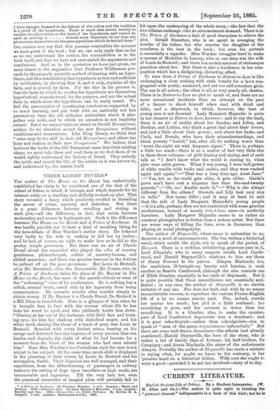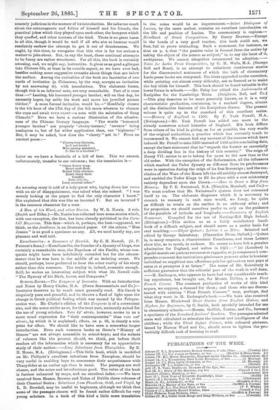CURRENT LITERATURE.
English Student-Life at Peking. By a Student-Interpreter. (W. H. Allen and Clo.)—The author is quite right in thinking the "personal element" indispensable in a book of this kind; but he is scarcely judicious in the manner of its introduction. He talks too much about the extravagance and follies of himself and his friends, the practical jokes which they played upon each other, the bumpers which they quaffed, and other matters of the kind. There is no great harm in all this, though it would be well if all who aim at humour would resolutely eschew the attempt to get it out of drunkenness. We ought, by this time, to recognise that this vice is far too serious a matter.to joke about. But, to say the least, these continual attempts to be fanny are rather wearisome. For all this, the book is certainly amusing, and, we might say, instructive. It gives us as good &glimpse into Chinese life, at least in its outside aspect, as we have ever had, besides making some suggestive remarks about things that are below the surface. Among the curiosities of the book are facsimiles of two cards of invitation (a Chinaman, by the way, accepts an invitation by not answering it), with translations. The elaborate forms, though this is an informal note, are very remarkable. Part of it rune thus:—" Lanting, his honoured younger brother, will on that day, he earnestly hopes, lay aside his work and move his jewelled person thither." A more formal invitation would be,—" Heedfully chosen is the 4th hour of the 17th day of the 8th moon whereon to cleanse the cups and await YOUR GLORY—a note with the salutation of Sung Chanohi." Here we have a curious illustration of the allusive- ness of the Chinese literary language. " The words honoured younger brother' are properly 'cherry-terrace,' 'terrace' ' being analogous to, but of far wider application than, our ' highness.' " Bat, it may be asked, how does the " cherry " get in ? From an ancient poem :—
" Cherry-tree blossom, Is it not lovely ?
Who among mankind, Is like to a brother ?"
Later on we have a facsimile of a bill of fare. This we cannot, unfortunately, transfer to our columns ; but the translation is-
" Onion flower soup. Roast crab flesh. Boiled little chicken. Roast sheep flesh.
Comfits.
Ices—Chi-lin.
Long original cakes."
An amusing story is told of a lady-guest who, laying down her menu with an air of disappointment, was asked what she missed. " I was merely looking at the paper to find the only character I know." She explained that this was like an inverted V. But an inverted V is the common character for a man.



































 Previous page
Previous page